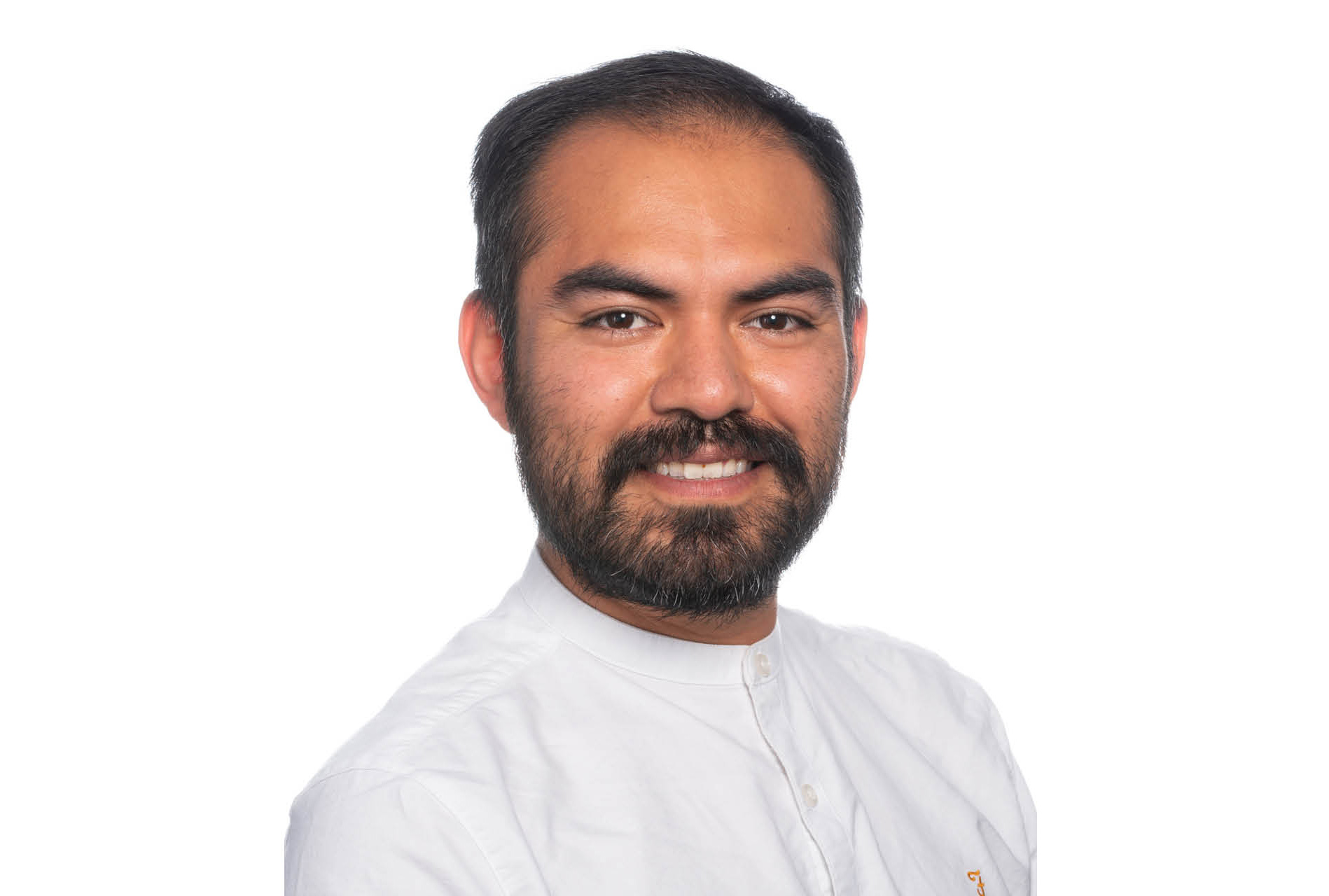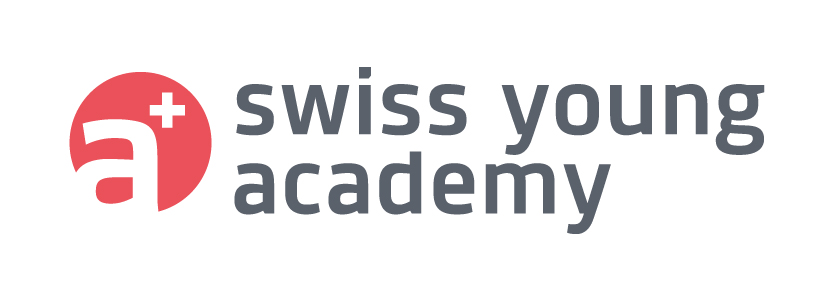Networking science.
Voguing between disciplines
Portrait I Astrid Tomczak-Plewka

He chooses his words carefully: "I don't want to brand shyness as a fault. But if I were to give young people a tip, it would be this: Don't hold back." Although Gustavo Ruiz Buendia has always been comfortable in front of audiences, it wasn’t until he started doing improvisational theater a few years ago that he was able to discover his style of appearing in front of an audience in a new way. "It changed my life," says the 33-year-old. "And it did so in more ways than one. First, I met my husband there, and second, I learned how to present." The second tip: "Don't be afraid to discover something new, to try different things, ask questions. Ask, ask and ask again."
Education was important for his parents
Gustavo grew up in Mexico together with a younger sister. His parents both worked at the Chapingo Autonomous University in the small town of Texcoco and were the first in their family to have completed a university education. They were "very enthusiastic" about their children’s education as well as their own jobs. "My father came from a poor background," Gustavo recounts. “The state university was the only way for him to go up in the world”. About his mother, he says, "She loved biochemistry." She passed on this enthusiasm to her son: when it came to choosing a career, it quickly became clear to him that he should head in a similar direction. "There was a program at the National Autonomous University of Mexico (UNAM) that combined biology, chemistry and programming. That's what I wanted to do." But the young man did not pass the entrance exam. At first, his world collapsed. "Looking back, I have to say, I didn't realize at the time that this program was dedicated to research." He took a one-year course in general biology. Then, when he was able to start the degree course at his second attempt, he knew what he was letting himself in for. "In retrospect, that gap year was a blessing in disguise; I matured a lot." So Gustavo went on to study "Genomic Sciences," a degree program in which students devote their 4th year entirely to research. Gustavo spent that year in Cold Spring Harbor Laboratory in New York. His supervisor recommended a research group in Switzerland, so he then came to the University of Lausanne for his master's degree, where he also completed his doctorate in integrative experimental and computational biology.
"Diversity is often reduced to gender"
He completed his doctorate in 2020 and the same year he became a member of the Swiss Young Academy. "For me, it was a great opportunity to network with other young researchers and also give myself visibility," he says. He was also attracted by the fact that the focus of the Swiss Young Academy is on addressing current social challenges, including beyond the field of human health. "That's not the case in my day-to-day work. I was very excited about interacting with people from social sciences, gender studies or law and learning from them." Have his expectations been met? "Absolutely," he says emphatically. "It was crystal clear to me from the beginning that the members were very enthusiastic about what they were doing." An example of this, he says, was their first outing together. "Already on the first walk, we developed a project idea." The project, which was born in the mountains of Crans-Montana, was "Challenging inequalities and precarious working conditions in Swiss academic institutions." With it, the group members wanted to address the precarious working conditions of early-career researchers and the systemic inequalities that minorities face in the Swiss academic landscape. "Diversity is often reduced to gender," Gustavo explains. Therefore, the group decided to specifically address minorities such as people of color, persons of Jewish or Muslim faith, first-generation scholars, and migrants. "As a migrant, non-white, and gay person, I am also one of them," he says. The biggest challenge in Switzerland, he says, was getting a work permit after completing his doctorate.
He wants to reach out to young people
Has this project made a difference? "In the first year, the main thing was to understand where the problems were. To do this, we invited those affected. Then, in the second year, we were able to build a network where those affected could support each other and exchange important information." In addition, he said, they had managed to establish contacts with various stakeholders and formulate initial recommendations. "I think we have definitely achieved something." The project has since been completed, and Gustavo is now involved in a project in which he and his fellow members want to illustrate to young adults how transdisciplinary collaboration can help overcome societal challenges. "The members of the Swiss Young Academy bring with them very different backgrounds. This offers a unique opportunity for collaboration," emphasizes the biologist. With this project, the Swiss Young Academy also wants to reach a non-academic audience, especially young people. "We want to address problems that young people are itching to solve, such as climate change and the energy crisis." Podcasts are planned with scientists who are researching precisely these topics.
"The members of the Swiss Young Academy bring with them very different backgrounds. This offers a unique opportunity for collaboration"
Gustavo Ruiz Buendía has not yet decided where his own future lies. He is currently working at the Swiss Institute of Bioinformatics, where he is mainly active in the field of onco-immunology and vaccines. This translation of research results into practice is very important to him, so he would like to continue working in the field of translational research in the future. “Either in academia or in industry, I will strive to improve human health through cross-border research.” Geographically, it's also not clear where he'll end up. That will probably also depend on what job opportunities are open to his French husband, who currently has a temporary position at the University of Lausanne.
Value of the family
What is clear to him, however, is which other goals he is pursuing with the Young Academy: "I would like to continue working on projects that have a sustainable effect - and not just on academia," he emphasizes. And he wants to help ensure that this network remains open to researchers from different backgrounds. He also lives up to these ideals in his free time - whether it's in improvisational theater or "voguing," a dance style that emerged in the 1960s in the ballroom scene of the Black and Latino LGBTQIA+ community in New York and has become a social movement in which queer people can live out their passion for community, dance and fashion at balls. Does his partner dance with him? "No," Gustavo says with a laugh. "He's in charge of cooking." Except, of course, when it comes to Mexican cuisine. About once a year, he travels to Mexico. "I say it sometimes a bit like in jest - but actually it's true: I miss the food, the family and the friends the most," he says with a laugh. Besides, he just knows the "social code." In Mexico, he says, it's much easier to get in touch with other people. Perhaps the best example of this is his mother: "She has friends everywhere. It gets funny sometimes - when we used to go away as a family, she would want to visit someone else everywhere," he recalls. "We sometimes had to remind her that we were going on a family vacation." At the same time, he stresses that he had learned from his mother "to go through life with joy," while his father had taught him one thing above all: To work hard. It was his family who had taught him the most important lessons and values in life - perhaps most of all his sister. "Even though she's younger, she's a role model for me," he says. "She's very determined. When she wants something, she achieves it." At the same time, he says, she is a very loving and generous person. "Every time I think of her, I have to smile." And indeed: at that moment, her big brother is beaming all over his face.
Biography
From Mexico to Lausanne
Gustavo Ruiz Buendía (b. 1990) was born and raised in Mexico, but spent several years in the United States with his family as a teenager. He earned a bachelor's degree in genomic sciences in Mexico and completed a research internship at Cold Spring Harbor Laboratory in New York during the last year of his bachelor's degree. He came to Lausanne for his master's degree, where he also completed his PhD. He is a founding member of the Swiss Young Academy and, among other things, is also active in "The Catalyst", a science entertainment collective that uses improvisational theater to disseminate scientific topics to a broad public.
